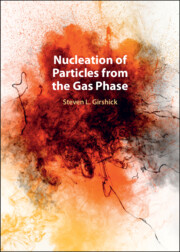Book contents
- Nucleation of Particles from the Gas Phase
- Reviews
- Nucleation of Particles from the Gas Phase
- Copyright page
- Dedication
- Contents
- Preface
- Symbols
- 1 Introduction
- 2 Single-Component Homogeneous Nucleation from a Supersaturated Vapor
- 3 Classical Nucleation Theory
- 4 Classical Theory of Multicomponent Nucleation
- 5 Classical Theory of Ion-Induced Nucleation
- 6 Atomistic Approaches to Homogeneous Nucleation
- 7 Transient Nucleation
- 8 Chemical Nucleation
- 9 Nucleation in Plasmas
- References
- Index
8 - Chemical Nucleation
Published online by Cambridge University Press: 30 May 2024
- Nucleation of Particles from the Gas Phase
- Reviews
- Nucleation of Particles from the Gas Phase
- Copyright page
- Dedication
- Contents
- Preface
- Symbols
- 1 Introduction
- 2 Single-Component Homogeneous Nucleation from a Supersaturated Vapor
- 3 Classical Nucleation Theory
- 4 Classical Theory of Multicomponent Nucleation
- 5 Classical Theory of Ion-Induced Nucleation
- 6 Atomistic Approaches to Homogeneous Nucleation
- 7 Transient Nucleation
- 8 Chemical Nucleation
- 9 Nucleation in Plasmas
- References
- Index
Summary
Chemical nucleation involves cluster growth by chemical reactions. In the case where clusters grow via a simple sequence of reversible chemical reactions, a summation expression for the steady-state nucleation rate can be derived. However, in many cases the chemical pathway to cluster growth is more complicated, and requires solving a set of species population balance equations that depend on the specific chemical system. Two examples are considered: soot nucleation in hydrocarbon combustion and nucleation of silicon particles in thermal decomposition of silane. In both cases, chemical kinetic mechanisms have been developed that allow for numerical simulations of particle formation. Soot nucleation is believed to proceed through the formation of polycyclic aromatic hydrocarbons. Models have been developed for the formation of the first aromatic ring and for subsequent growth, either through reaction with small molecules or by coagulation. Silicon nucleation from silane involves a large set of silicon hydride species, which can be grouped into classes according to their structure and reactivity, facilitating estimates of their free energies and reaction rate constants.
Keywords
- Type
- Chapter
- Information
- Nucleation of Particles from the Gas Phase , pp. 166 - 184Publisher: Cambridge University PressPrint publication year: 2024



